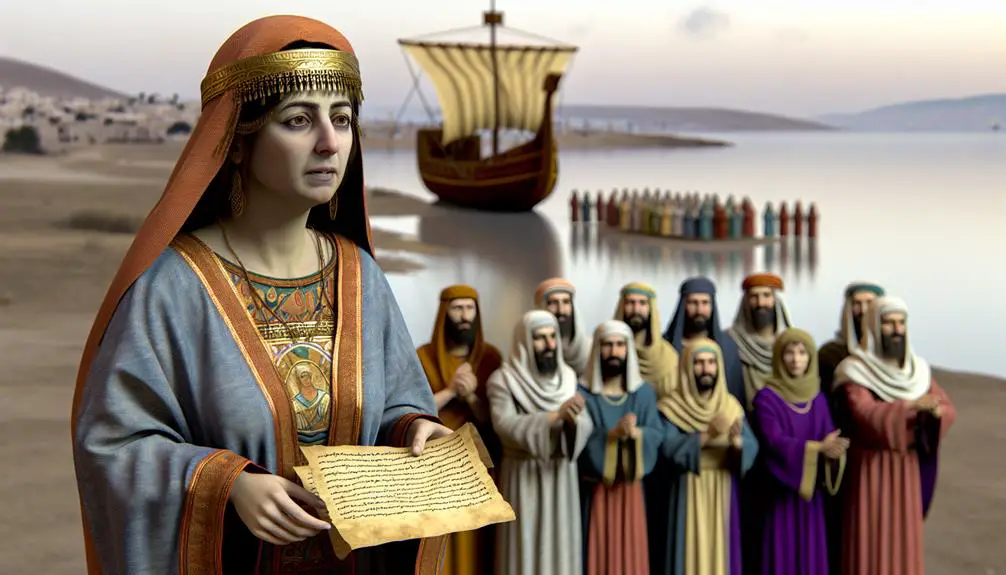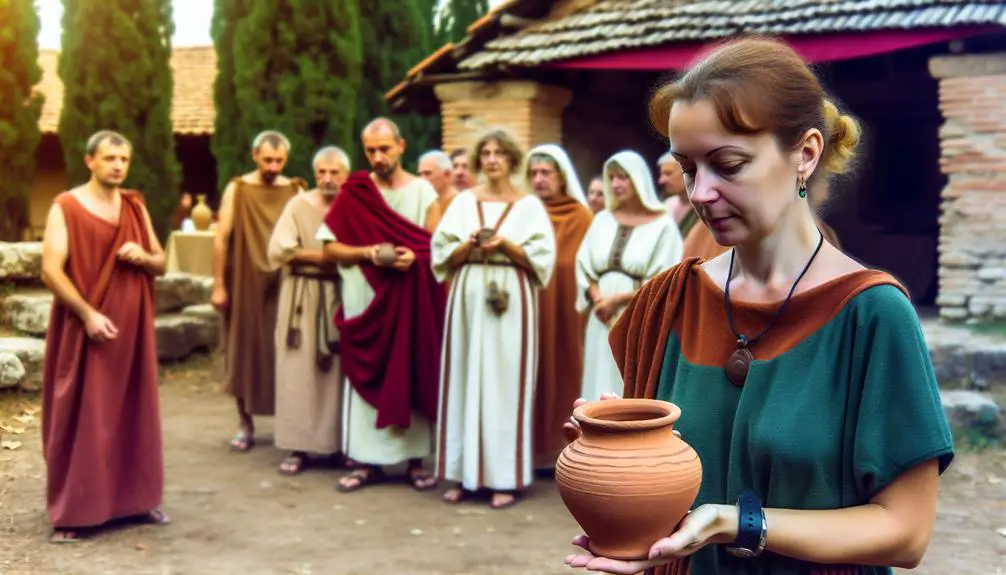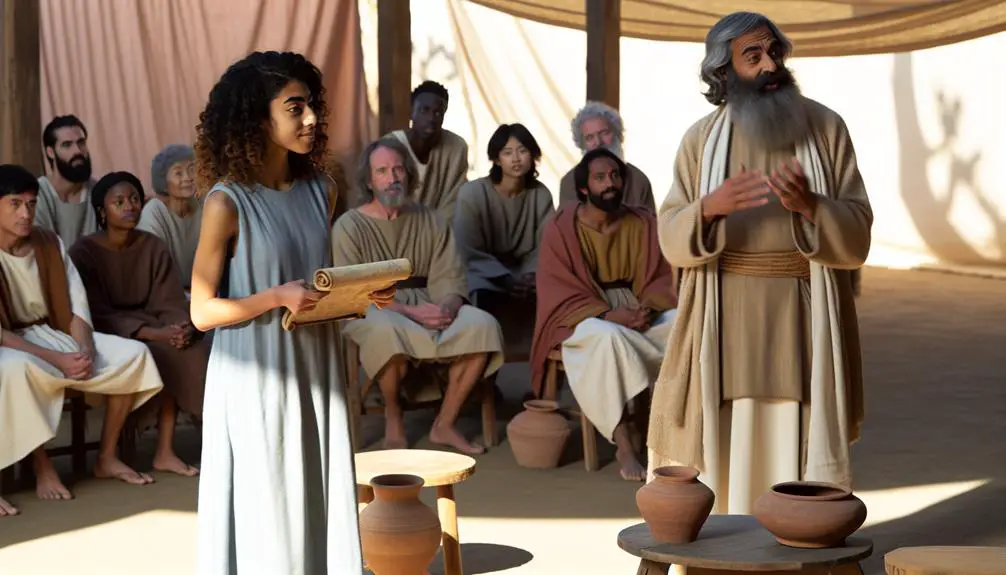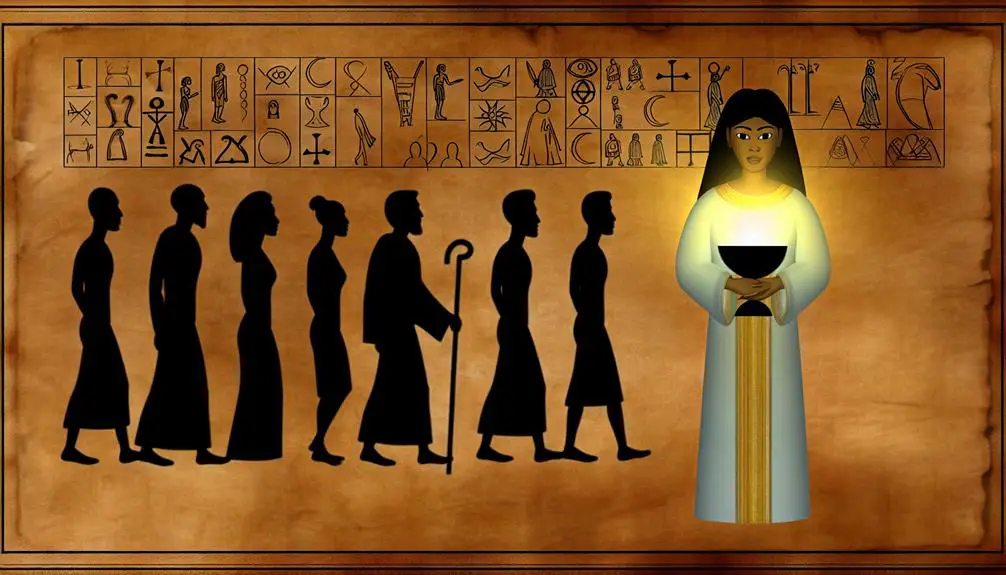A pivotal figure in early Christianity, Phoebe's story illuminates the significant yet often overlooked roles of women in the Bible.

Phoebe in the Bible
Like a beacon in the night, Phoebe's presence in the Bible illuminates the roles women played in the early Christian church. You might know her from the brief mention in Romans, but there's a depth to her story and contributions that often goes unnoticed.
As a deaconess, her role was pivotal, not just in her community but in the broader context of Christianity's development. You'll find her actions and the trust placed in her by Paul intriguing, hinting at a narrative rich with historical and theological significance.
Let's explore what made Phoebe so remarkable, and perhaps, you'll uncover why her legacy continues to inspire discussions about women's roles in religious history.
Key Takeaways
- Phoebe played a pivotal role in early Christianity as a deaconess and supporter of Paul's missions.
- Her involvement challenges traditional gender norms, showcasing early church's progressive stance on women's leadership.
- Phoebe's contributions to the church and Paul's work were significant, aiding in the spread and establishment of Christianity.
- Her legacy continues to spark debates on gender roles and leadership within the church, highlighting her historical and theological significance.
Who Was Phoebe?

Phoebe, a notable figure mentioned in the New Testament of the Bible, serves as a testament to the significant roles women played in the early Christian community. Delving into Phoebe's origins, she hailed from Cenchreae, a port near Corinth, suggesting she was well-positioned to be a benefactor and a leader within her community. This geographical detail not only sheds light on her possible social and economic status but also highlights the interconnectedness of early Christian communities across different regions.
The cultural context of Phoebe's time was characterized by patriarchal norms, where women's roles were significantly restricted in public and religious spheres. However, Phoebe's mention in the scriptures challenges these societal norms, indicating a level of respect and authority not commonly afforded to women of her time. Her role, possibly as a deaconess, underscores the early Christian movement's progressive stance on women's roles in religious activities.
Understanding Phoebe within her cultural and historical milieu allows for a deeper appreciation of her contribution to the early Christian community. It also underscores the dynamic nature of these communities in adapting and challenging the prevailing social norms of the time.
Phoebe's Mention in Romans
In the New Testament's Epistle to the Romans, specifically within the concluding chapter, we encounter a pivotal reference to Phoebe, illuminating her esteemed role within the early Christian community. This mention not only highlights her significance but also sheds light on the practices of Roman travel and letter delivery within the early church.
When dissecting Phoebe's mention in Romans, consider the following key points:
- Context of Mention: Phoebe is introduced with commendation, suggesting her vital role in the community and the trust placed in her for important tasks.
- Roman Travel: The reference indicates Phoebe's impending journey to Rome, underscoring the extensive network of Roman roads and the mobility of early Christians for mission and ministry purposes.
- Letter Delivery: Her mention is closely linked with the delivery of Paul's Epistle to the Romans, showcasing the reliance on trustworthy individuals for the dissemination of apostolic letters across vast distances.
This brief analysis underscores the intricate web of social, logistical, and spiritual elements at play in the early Christian movement. Phoebe's mention in Romans not only highlights her personal commendation but also serves as a window into the practical aspects of church life and communication during a pivotal period in Christian history.
The Role of Deaconess

You must consider Phoebe's role as a deaconess within the context of early Christianity to understand her contributions to the church and her significance.
Her position challenges traditional views on women's roles in the church, highlighting a complex layer of early Christian leadership.
Analyzing her contributions sheds light on the evolving nature of church leadership and the pivotal role women played in its development.
Phoebe's Church Contributions
Distinguishing herself through service, Phoebe's role as a deaconess significantly contributed to the early Christian church's operations and community support. Her involvement wasn't merely auxiliary; it was pivotal in advancing the church's mission through:
- Charitable acts: Phoebe's efforts in providing for the needy underscored the church's commitment to social welfare.
- Social support: She played a crucial role in fostering a sense of community among believers, offering both spiritual and material assistance.
- Leadership and guidance: Phoebe's position allowed her to guide newer members in their faith journey, acting as a bridge between the church's leadership and its congregation.
Her contributions illustrate the indispensable role of women in nurturing the fledgling Christian community, thus laying a foundation for future generations.
Significance in Early Christianity
Analyzing the role of deaconess, it's clear that women like Phoebe played a critical part in shaping the early Christian church's structure and community dynamics. Her position illuminates the nuanced understanding of gender roles within the nascent Christian communities.
Unlike the prevailing cultural context, which often relegated women to the peripheries of religious and social leadership, the early church displayed a progressive stance by recognizing and affirming the leadership roles women could hold. Phoebe's designation as a deaconess, referenced in the New Testament, underscores the early Christian commitment to inclusivity and equality.
This acknowledgment not only highlights the vital contributions of women in the foundational stages of Christianity but also challenges contemporary interpretations of gender roles within religious practices.
Phoebe's Contributions to Christianity
Phoebe's contributions to Christianity, notably her role as a deacon and a benefactor, significantly impacted the early church's development and the spread of its teachings. Her involvement serves as a pivotal example in scriptural debates related to gender roles within the church's hierarchy, challenging traditional interpretations and inviting a reevaluation of women's roles in early Christian communities.
- Deaconship: Phoebe's position as a deacon in the church of Cenchreae underscores her leadership and service roles, highlighting the active participation of women in early Christian ministries.
- Benefaction: Her role as a benefactor demonstrates the crucial support provided by women in the financial and logistical aspects of early Christian communities, ensuring the spread and sustainability of Christian teachings.
- Gender Roles in Early Christianity: Phoebe's prominent position initiated ongoing scriptural debates regarding the involvement of women in church leadership roles, challenging and expanding traditional views on gender roles within the faith.
Analyzing Phoebe's contributions offers invaluable insights into the dynamics of early Christianity, emphasizing the essential roles played by women in its development and the evolution of gender roles within the church.
Patron of Paul and Others

Building on her recognized roles within the early Christian community, Phoebe also significantly supported figures such as Paul, serving as a crucial patron and ally in their missions. Her backing wasn't simply moral but also financial and logistical, facilitating ancient travels that were essential for spreading the Christian message. As a community advocate, Phoebe's involvement went beyond mere support; she was instrumental in bridging the gap between various Christian groups and leaders.
Her role as a patron wasn't a casual commitment. Phoebe's dedication to aiding Paul and others underscores the vital part women played in the early church, not just in supportive roles but as leaders and benefactors. This support was indispensable for the missionaries who faced numerous challenges, from logistical hurdles to outright hostility. By ensuring that these early leaders could travel, communicate, and teach, Phoebe directly contributed to the growth and establishment of Christian communities across the ancient world.
Her actions as a community advocate and patron highlight the interconnectedness of the early Christian movement. Phoebe's work, underpinned by her faith and resources, exemplifies the collective effort required to nurture and expand this nascent faith across diverse and often hostile environments.
Historical and Theological Significance
Delving into the historical and theological significance of Phoebe reveals her pivotal role in shaping early Christian doctrine and community dynamics. Her presence in the New Testament, specifically mentioned by Paul in Romans 16:1-2, not only highlights her as a key figure but also provides a lens through which to examine the broader cultural and religious landscape of the time.
To grasp the full extent of Phoebe's influence, consider these aspects:
- Gender Roles: Phoebe's leadership and service challenge traditional gender roles of her era, suggesting a more inclusive view of women's roles in early Christian communities.
- Cultural Context: Her position as a deacon and a patron within the church reflects the socio-economic structures of the time, indicating how Christianity adapted to and was shaped by existing cultural norms.
- Theological Contributions: Through her actions and the recognition by Paul, Phoebe contributed to the theological discourse on the role of women in church leadership, setting precedents for future discussions and interpretations.
Understanding Phoebe's story within these dimensions sheds light on the complexities of early Christian theology and the societal norms it both challenged and conformed to.
Phoebe's Impact on Early Church

You must consider Phoebe's role in the early church through her leadership and support of Paul's missions.
Her actions provide a clear example of female leadership within the nascent Christian community, challenging contemporary norms.
This analysis reveals her significant contribution to the spread and establishment of early Christianity.
Phoebe's Leadership Role
Phoebe's leadership role significantly influenced the early Christian church, demonstrating her pivotal position within the community. Her presence and actions challenged the prevailing gender dynamics, showcasing a woman's capability in leadership during a period when such roles were predominantly male-dominated. Phoebe's involvement in ancient travels, possibly as a benefactor and emissary, further underscores her significant role and the trust placed in her.
Consider these aspects:
- Gender Dynamics: Phoebe navigated and reshaped the gender expectations of her time, establishing a model for future female leaders in the church.
- Ancient Travels: Her mobility and active participation in the church's missions highlight her importance beyond local confines.
- Community Impact: Phoebe's leadership directly influenced the growth and strengthening of the early Christian church, marking her as a key figure in its development.
Supporting Paul's Missions
Building on her leadership role, Phoebe also played a crucial part in supporting Paul's missions, further amplifying her impact on the early Christian church.
By managing the financial logistics crucial for the sustenance of these missions, she ensured that resources were efficiently allocated and utilized.
Her involvement went beyond mere funding; she facilitated the intricate ancient travel arrangements necessary for Paul and his companions to spread their teachings across vast territories.
This not only demonstrates her organizational prowess but also underscores her deep commitment to the cause.
Through her strategic support, Phoebe significantly contributed to the expansion of the early church, showcasing her role as a pivotal figure in the nascent Christian community.
Her actions epitomize the indispensable support roles that facilitated the spread of Christianity in its early days.
Legacy and Modern Interpretations
Throughout the centuries, Phoebe's role in the early Christian community has been subject to various interpretations and debates among scholars and theologians. Her mention in the New Testament, albeit brief, opens a window into the socio-religious dynamics of the first-century Christian congregations and how they navigated leadership, gender roles, and community support.
- Feminist Perspectives: Modern feminist theologians often highlight Phoebe's leadership and service as a deaconess, viewing her as a pioneering figure in challenging the patriarchal norms of her time. This interpretation draws attention to the broader cultural contexts in which female leadership was both necessary and contested within early Christian communities.
- Cultural Contexts: Understanding Phoebe's legacy requires an appreciation of the cultural and historical backdrop of the early church. Her role as a benefactor and a deaconess is seen as indicative of the early Christian movement's inclusivity and its break from traditional Jewish and Roman societal norms.
- Modern Interpretations: Today, theologians and scholars continue to debate Phoebe's exact roles and titles, with her story inspiring discussions on gender equality, leadership, and the recognition of women's contributions to the early church.
Phoebe's legacy thus remains a compelling subject for scholarly analysis, offering insights into early Christian practices and the evolving understanding of gender roles in religious contexts.
Frequently Asked Questions
How Did the Cultural Context of the 1st Century Influence Phoebe's Ability to Serve in Her Role Within the Early Christian Community?
In the 1st century, your ability to serve in any community role was deeply influenced by Roman social norms and economic status. These factors dictated social and religious participation. They could either limit or empower your contributions.
In early Christian communities, despite prevailing gender norms, if you held a certain economic status, you might navigate these constraints more effectively, enabling a more significant role in service and leadership within the religious community.
Are There Any Extra-Biblical Historical Documents or Sources That Provide More Insight Into Phoebe's Life and Work Outside of Her Mention in Romans?
Embarking on a quest for truth, you're searching for Phoebe's artifacts, digging through history's layers. Unfortunately, the trail's cold; no extra-biblical historical documents or sources cast light on her life and work beyond Romans.
The quest for documentation authenticity hits a wall, leaving scholars to piece together her influence from scant details. Your analytical, scholarly gaze finds the landscape barren, a testament to the fragmented nature of ancient records.
What Specific Challenges Did Phoebe Face as a Woman in Her Position of Leadership Within the Early Church, and How Did She Overcome Them?
Facing leadership roles often meant confronting gender barriers. You'd navigate these by adapting your leadership styles to be both assertive and empathetic, balancing authority with understanding.
This approach not only helped you overcome skepticism but also established your credibility and influence within the community. By leveraging your skills and resilience, you'd break through societal limitations, setting a precedent for others to follow, thus reshaping traditional views on leadership and gender roles.
How Has Phoebe's Story Influenced the Role and Perception of Women in Leadership Positions Within Modern Christian Denominations?
You're exploring how historical narratives shape modern perceptions of gender roles and leadership dynamics.
This analysis reveals that stories of pioneering figures challenge traditional views and inspire a more inclusive approach to leadership within communities.
Specifically, such narratives have encouraged a reevaluation of leadership roles in various sectors, promoting greater acceptance and visibility of women leaders.
This shift has significantly influenced both the role and perception of women in leadership across Christian denominations today.
Can Parallels Be Drawn Between Phoebe's Contributions to Early Christianity and the Contributions of Women in Other Contemporary Religious Movements or Societies Outside of the Judeo-Christian Tradition?
Absolutely, you can draw parallels between women's roles in early Christianity and their contributions in other religious movements. By examining gender dynamics and comparative mythology, you'll find numerous instances where women have significantly influenced religious practices and leadership, similar to Phoebe's impact.
This cross-cultural analysis highlights the pivotal role that women have played across different societies, challenging traditional narratives and showcasing their integral contributions to spiritual and communal development.
Conclusion
Interestingly, as you've delved into the story of Phoebe, it's almost as if you've uncovered a hidden gem within the early Christian narrative.
Phoebe wasn't just a footnote; her role as a deaconess and a patron illuminated the path for women in ministry, challenging norms and setting precedents.
Her contributions, often underestimated, played a pivotal role in the dissemination of Christian teachings.
Analyzing her impact reveals a profound legacy, one that reshapes our understanding of early Christian dynamics and the inclusivity preached by the faith.



Sign up